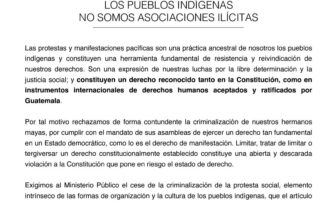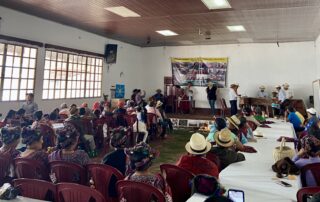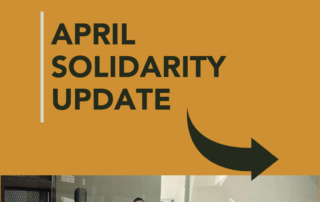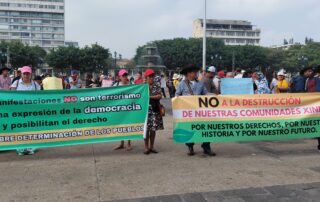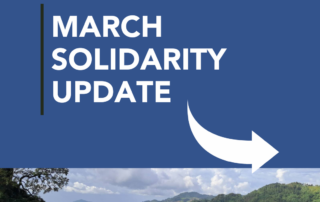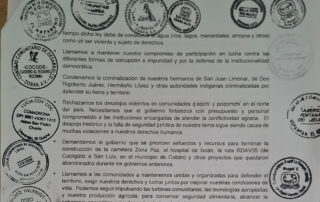Sepur Zarco
On February 26, 2016, indigenous women from the community of Sepur Zarco made history when they and their legal team successfully prosecuted former Guatemalan military officials for sexual and domestic slavery. Based largely on the testimonies of 15 Q’eqchi’ survivors, a Guatemalan tribunal convicted two men—former Military Commissioner Heriberto Valdez Asig and former Colonel Esteelmer Francisco Reyes Girón—of crimes against humanity for sexual and domestic slavery carried out at a military recreation center in the 1980s.
While the defendants faced charges for other crimes committed in the same context, including the forced disappearance of several of the women’s husbands, the trial holds national significance as the first transitional justice case in Guatemala to firmly center the experiences and impacts of sexual and domestic violence against women during the internal armed conflict.
When I became strong enough to be able to say what I had to say, I told the whole truth. That was what gave me strength…The moment came that we had been waiting for, for so long – to see justice.
In-depth NISGUA reports

Q’eqchi’ women set a precedent in Guatemala with first-ever conviction for sexual and domestic slavery.

Report-back from the “Guatemalan Women Healing Towards Justice” tour, featuring Maudi Tzay from the Alliance to Break Silence and Impunity.
In the early 1980s, communities in the Polochic Valley in Guatemala challenged wealthy landowners for legal titles to their ancestral lands. Around the same time, Guatemalan dictatorships constructed several military bases around the region of Sepur Zarco with the support of the U.S. The base built in Sepur Zarco was designated a military recreation center, where troops would return after taking 15-day rotations patrolling the surrounding mountains.
The soldiers at the Sepur Zarco military base disappeared men from the community who were seeking land titles, demonstrating the powerful connections between wealthy elites and the military. The women that survived them were then forced into sexual and domestic slavery for years. The trial illustrated how patriarchy and racism play out on women’s bodies in war. Grounded in the recognition that these systems endure today in Guatemala and the world over, the women survivors prosecuted this case as part of a multi-faceted strategy for social change. To do so they worked with a coalition of feminist, legal, and psychosocial organizations known as the Alliance to Break Silence and End Impunity.

Photo: CPR Urbana
The intergenerational struggle for access to and protection of land
After the verdict, the courts ordered 18 reparations to redress the physical, psychological, and material impacts of the violence. These include increased access to healthcare and education for survivors and community members, and legal reforms to reduce the barriers against survivors of sexual violence. The reparations focused on repairing harm, dissuading future violence, and community healing.
Survivors repeatedly testified to the psychological and economic impact of their husbands’ disappearances and how a lack of land access has perpetuated poverty. To carry out court ordered reparations, the Guatemalan national land registry must grant land titles and prioritize families of those forcibly disappeared while in the process of registering their land. Nonetheless, almost three years after the sentence, survivors have yet to receive titling.

In Solidarity
The Alliance to End Silence and Impunity called upon the international community to stand in solidarity with the women survivors of Sepur Zarco to ensure the legal system respects the sentence. The Alliance made direct requests for accompaniment, reporting, and advocacy to broaden the social impact of the case on a global scale.
Members of NISGUA responded to this call by gathering together to educate themselves and express solidarity with the survivors. We strengthened movements in Guatemala and the U.S. by drawing direct connections with local feminist struggles for gender justice and indigenous solidarity.
Latest from our blog
Statement from the Xinka People: Support for Persecuted Indigenous Authorities // Comunicado del Pueblo Xinka: Apoyo a Autoridades Indígenas
Unofficial translation by the Network in Solidarity with the People of Guatemala (NISGUA). You can find the original statement in Spanish further below. // Puedes encontrar el comunicado original en español más abajo. Xinka [...]
Statement from the Coordinator of Ixil Organizations on the 12th Anniversary of the Genocide Verdict // Comunicado de la Coordinadora de Organizaciones Ixiles en el 12° Aniversario de la Sentencia por Genocidio
Unofficial translation by the Network in Solidarity with the People of Guatemala (NISGUA). You can find the original statement in Spanish further below. // Puedes encontrar el comunicado original en español más abajo. Coordinating [...]
April Solidarity Update // Actualización Solidaria de Abril 2025
[Español a continuación] In the April Solidarity Update: 🌱 ACODET’s General Assembly elected new Board members for 2025-2027. The representatives signed a statement and reaffirmed their commitment to defending territory, water, and life against [...]
Statement: The Xinka People do not consent to the “El Escobal” Mining Project // Comunicado: El Pueblo Xinka no da su consentimiento al Proyecto Minero “El Escobal”
Unofficial translation by the Network in Solidarity with the People of Guatemala (NISGUA). You can find the original statement in Spanish further below. // Puedes encontrar el comunicado original en español más abajo. The [...]
March Solidarity Update // Actualización Solidaria de Marzo 2025
[Español a continuación] In the March Solidarity Update: 💧 On World Water Day, Guatemalan communities celebrated their efforts to protect water. Various collectives and organizations participated in events on water management and community-driven water [...]
Comunicado de la Asamblea General de ACODET 2025
ASOCIACIÓN DE COMUNIDADES PARA EL DESARROLLO Y LA DEFENSA DE LA TIERRA Y LOS RECURSOS NATURALES (ACODET) En esta Asamblea General 2025, las comunidades amenazadas por la construcción de la represa Xalalá reafirmamos nuestro [...]











